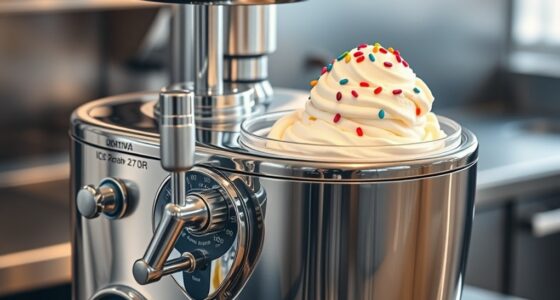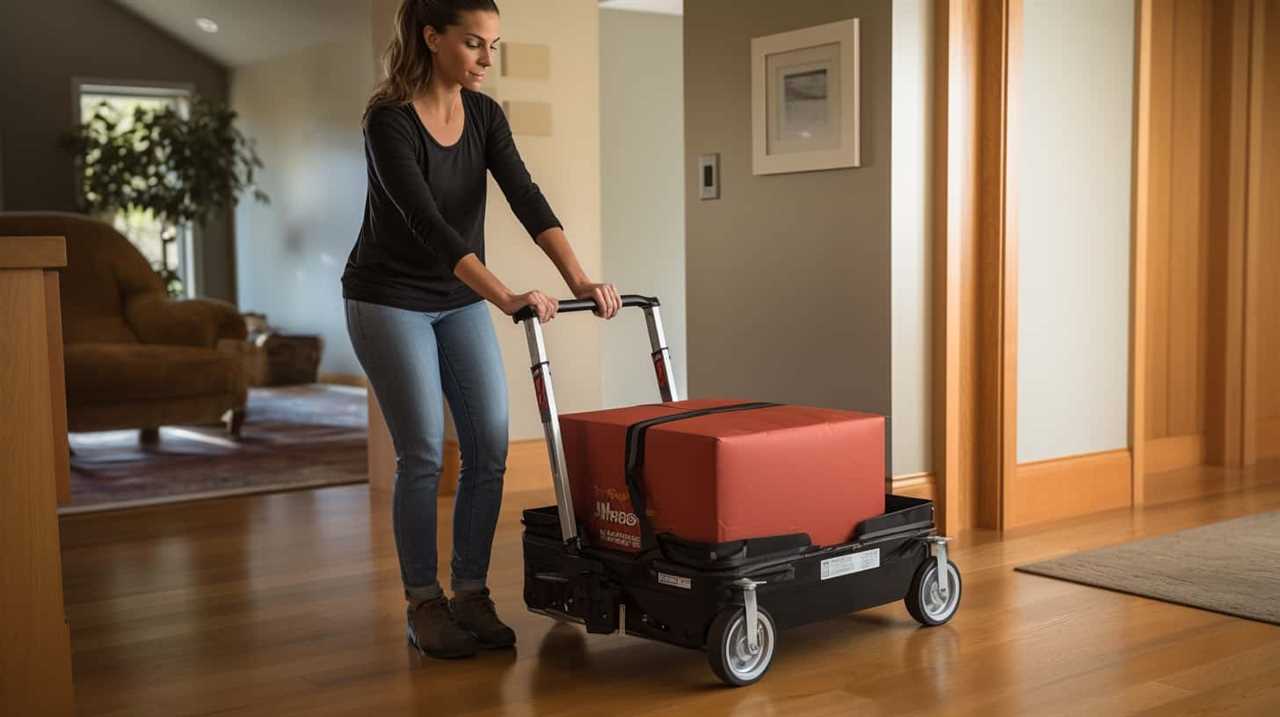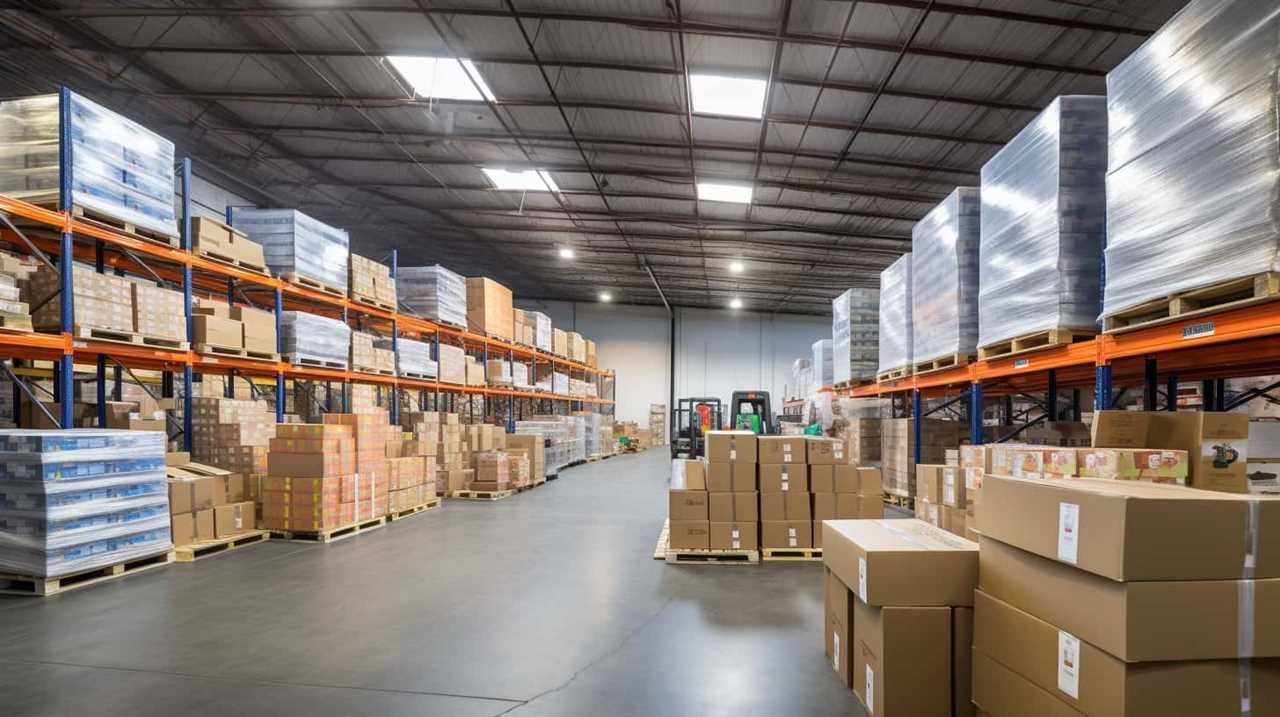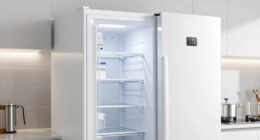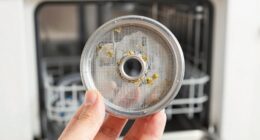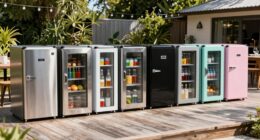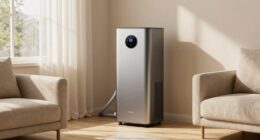Are you tired of feeling anxious about using your home appliances? Don’t worry, we have put together seven crucial tips for using home appliances safely that will help ease your mind.
By following these guidelines, you can ensure the utmost safety and longevity of your appliances. We will show you how to:
- Choose reliable brands
- Read and follow the user manual
- Inspect cords and plugs regularly
- Keep appliances away from water
- Use surge protectors
- Be cautious with gas appliances
- Install carbon monoxide detectors
Additionally, staying alert for strange noises or smells and regularly testing and replacing batteries in smoke detectors are crucial steps in maintaining a safe home environment.
So let’s dive in and become masters of home appliance safety together!

Key Takeaways
- Choose well-established and reputable brands for reliable appliances
- Read and follow the user manual for safety instructions and proper usage
- Regularly inspect cords and plugs to prevent accidents and electrical hazards
- Stay alert, test detectors, and replace batteries for effective detection and prevention
Choose Reliable Brands
When it comes to selecting home appliances, we recommend choosing well-established and reputable brands. Opting for reputable manufacturers ensures product reliability and peace of mind. Established brands have a proven track record of delivering high-quality appliances that stand the test of time.
Reputable manufacturers invest in research and development to produce reliable products that meet industry standards. They prioritize durability and performance, using quality materials and advanced technologies. By choosing these brands, you can minimize the risk of experiencing frequent breakdowns or malfunctions.
Moreover, reputable manufacturers often provide excellent customer service and reliable after-sales support. They offer warranties and guarantees that protect your investment and provide reassurance in case of any issues.
When you buy from well-established brands, you can trust that their appliances have undergone rigorous testing and adhere to industry safety standards. This reduces the risk of accidents or hazards, ensuring the safety of you and your family.
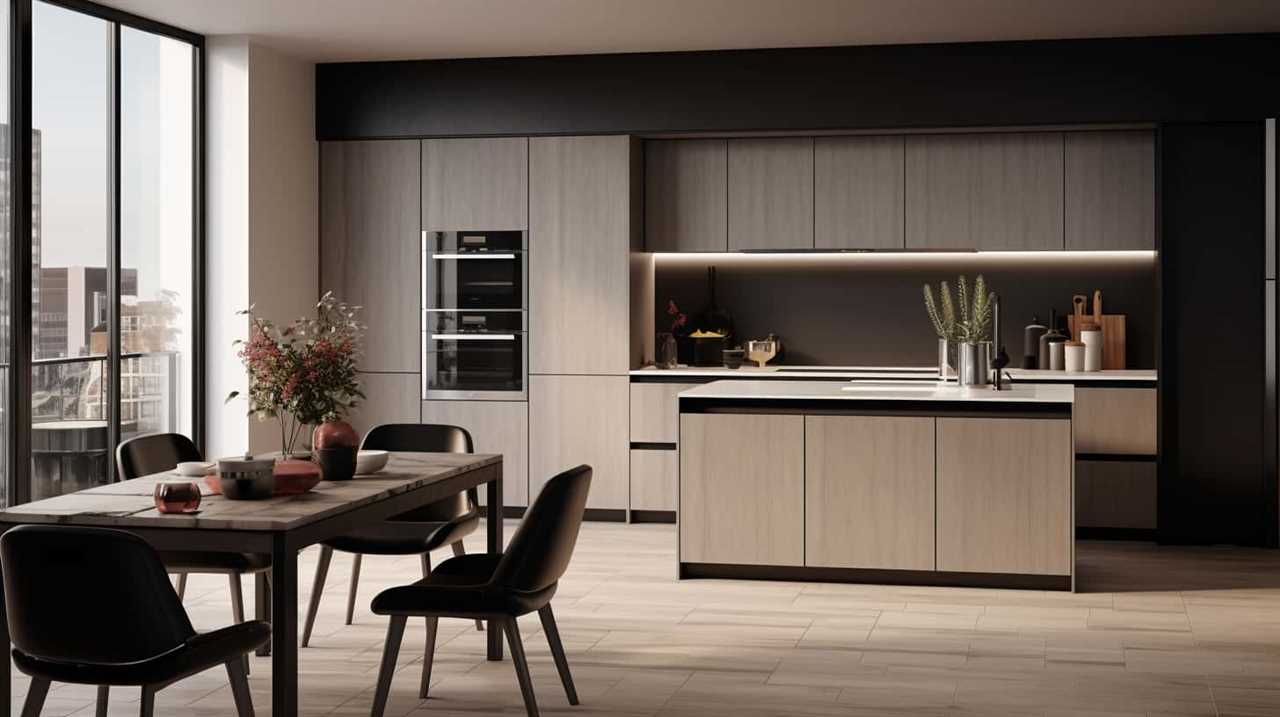
Read and Follow the User Manual
When it comes to using home appliances safely, one of the most important things to do is to read and follow the user manual.
The manual provides essential information about the appliance’s features, functions, and potential risks.
Manual for Appliance Safety
To ensure safe use of home appliances, it’s imperative that we thoroughly read and follow the user manual. The manual serves as a comprehensive guide, providing essential information on gas appliance safety and carbon monoxide prevention.
Gas appliances, such as stoves and water heaters, can pose serious risks if not handled properly. The user manual will outline the correct installation procedures, as well as important safety precautions to prevent gas leaks and potential fires.

Additionally, it will provide instructions on how to properly maintain and clean the appliance to ensure its optimal performance and longevity.
Importance of Following
How can we ensure safe use of home appliances and prevent potential risks associated with gas appliances?
One of the most crucial steps is to carefully read and follow the user manual provided with the appliance. Following instructions is paramount when it comes to appliance safety.
The user manual contains important information about installation, operation, and maintenance, which can help prevent accidents and ensure the longevity of the appliance. It provides specific guidelines on how to use the appliance correctly and safely.
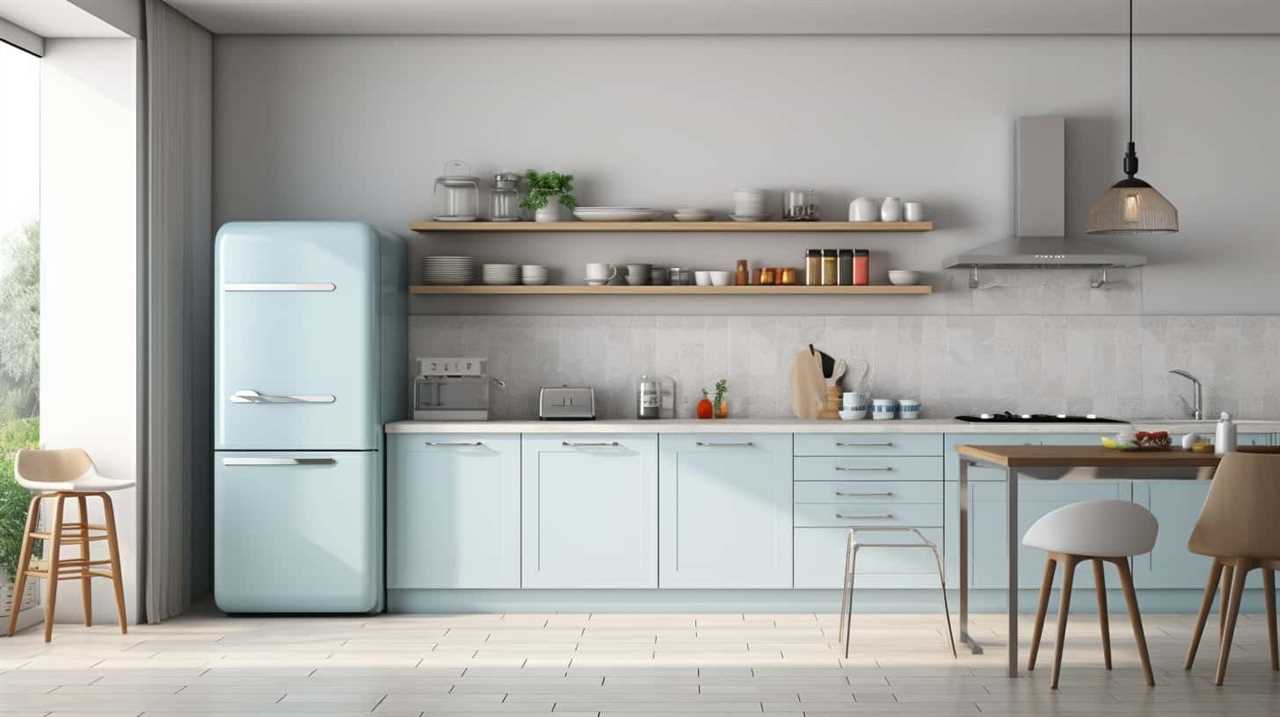
Instructions Ensure Safe Use
By carefully reading and following the user manual, we can ensure the safe use of home appliances and prevent potential risks associated with gas appliances. Here are some key reasons why the user manual is essential for safe appliance use:
- Avoid Accidents: The user manual provides detailed instructions on how to operate the appliance correctly, reducing the risk of accidents or injuries.
- Prevent Damage: Following the user manual helps us understand the appliance’s limitations and prevent damage caused by misuse.
- Maximize Efficiency: The manual contains valuable tips and tricks to optimize the appliance’s performance, helping us save energy and money.
- Warranty Protection: Adhering to the user manual’s guidelines ensures compliance with the manufacturer’s requirements, preserving the warranty.
When it comes to reliable brands, their user manuals are designed to be comprehensive and user-friendly, making it easier for us to understand and operate the appliance safely.
Now that we understand the importance of following the user manual, let’s move on to the next tip: inspecting cords and plugs regularly.
Inspect Cords and Plugs Regularly
Now let’s talk about the importance of inspecting cords and plugs regularly.
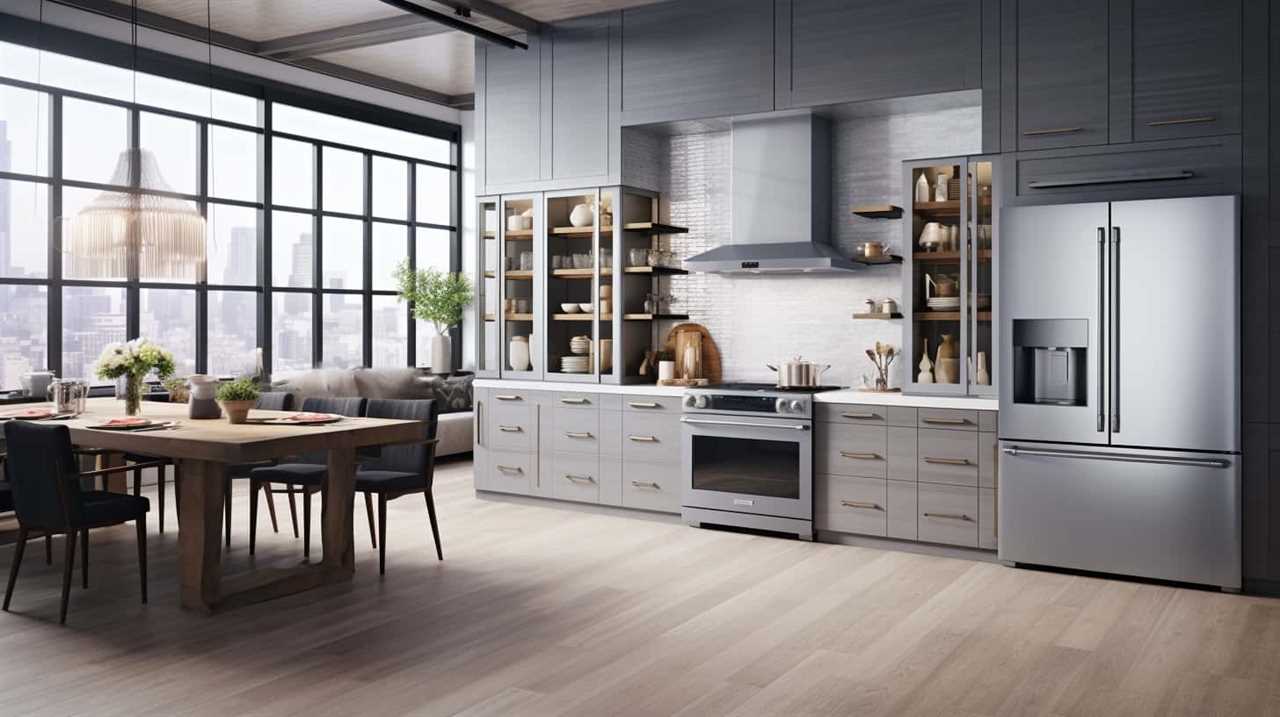
Cord safety checks are crucial to ensuring the safe operation of our home appliances. We must also remember the significance of plug maintenance, as damaged plugs can pose serious risks.
To maintain a safe environment, it’s highly recommended to conduct regular inspections of cords and plugs to identify any potential hazards.
Cord Safety Checks
To ensure safe home appliance use, we regularly inspect cords and plugs for any signs of damage or wear. Cord safety checks are crucial in maintaining the overall safety of your appliances and preventing potential hazards.
Here are some essential points to consider:

- Cord organization: Keep cords neat and tidy to prevent tripping hazards and accidental damage. Use cord organizers or cable ties to keep them organized and out of the way.
- Electrical outlet placement: Ensure that electrical outlets are properly placed and easily accessible. Avoid overloading outlets with too many appliances, as it can lead to overheating and potential electrical fires.
By regularly inspecting cords and plugs and paying attention to cord organization and electrical outlet placement, you can significantly reduce the risk of accidents and electrical hazards in your home.
Now, let’s move on to the next section and discuss the importance of plug maintenance.
Plug Maintenance Importance
Regularly inspecting cords and plugs for any signs of damage or wear is crucial in maintaining the overall safety of your home appliances.
It’s important to prioritize plug safety to prevent electrical hazards and potential accidents. Over time, plugs can become worn out or damaged, leading to frayed cords or loose connections. These issues can increase the risk of electrical shocks or fires.

To ensure plug safety, take the time to inspect cords and plugs regularly. Look for any visible signs of damage, such as exposed wires, cracked plugs, or loose connections. If you notice any issues, it’s essential to repair or replace the plug immediately.
Regular Inspections Recommended
We should make it a habit to regularly inspect cords and plugs for any signs of damage or wear. Regular inspections offer numerous benefits and help to ensure the safe and efficient operation of home appliances. Here are some reasons why regular inspections are important:
- Prevent Accidents: Regular inspections can identify frayed or damaged cords, loose plugs, or exposed wires, reducing the risk of electrical accidents such as shocks or fires.
- Extend Lifespan: By detecting issues early on, regular inspections can help prevent further damage to cords and plugs, prolonging the lifespan of appliances.
- Lower Repair Costs: Addressing minor issues during inspections can prevent costly repairs or replacements in the future.
- Promote Energy Efficiency: Well-maintained cords and plugs ensure optimal energy consumption, saving money on utility bills.
While regular inspections can be done by homeowners, it’s also important to consider professional inspections. Professional inspections provide an added level of expertise and ensure that all safety standards are met. These inspections can identify potential hazards that may go unnoticed by untrained individuals.
By prioritizing regular inspections and considering professional help, we can take proactive steps to keep our appliances functioning safely and efficiently.

Speaking of safety, let’s now discuss the importance of keeping appliances away from water.
Keep Appliances Away From Water
Our priority is to ensure the safety of our household by keeping all appliances away from water. Water damage prevention is crucial in maintaining the longevity and functionality of our appliances. Placing appliances in areas where they aren’t exposed to water is essential to avoid potential accidents and damage.
When positioning appliances, it’s important to consider their proximity to water sources such as sinks, showers, and toilets. Keep them at a safe distance to minimize the risk of water splashing or spilling onto them. Additionally, ensure that electrical appliances are kept away from wet areas to prevent the possibility of electric shock.
Furthermore, it’s advisable to install ground fault circuit interrupters (GFCIs) in areas where water and electrical appliances coexist, such as kitchens and bathrooms. GFCIs are designed to quickly shut off the power supply when a ground fault occurs, protecting both the appliances and individuals from potential harm.

Regularly inspecting appliances for any signs of water damage is also crucial. Look for rust, corrosion, or water marks, as these can indicate potential water-related issues. If any damage is detected, it’s important to address it promptly to prevent further damage or potential hazards.
Use Surge Protectors
Now let’s talk about the importance of using surge protectors to keep our home appliances safe.
Surge protectors play a crucial role in preventing electrical fires and protecting our equipment from damage caused by power surges. They act as a barrier between our appliances and sudden voltage spikes, ensuring their longevity and reducing the risk of potential hazards.
Additionally, using surge protectors eliminates the need for unsafe extension cords, promoting overall electrical safety in our homes.

Electrical Fire Prevention
To prevent electrical fires, it’s crucial to utilize surge protectors for all home appliances. Surge protectors are essential in safeguarding your home from power surges and preventing potential electrical fires.
Here are two important reasons why you should prioritize using surge protectors:
- Protection from voltage spikes: Power surges can occur due to lightning strikes, faulty wiring, or utility grid issues. Surge protectors are designed to detect these voltage spikes and divert the excess electricity away from your appliances, thus protecting them from damage and reducing the risk of fire.
- Enhanced safety for sensitive electronics: Many modern appliances, such as computers, televisions, and gaming consoles, are sensitive to power fluctuations. Surge protectors provide a stable and regulated power supply, preventing electrical fires and ensuring the longevity of your electronics.
Equipment Damage Prevention
To further safeguard our appliances and prevent equipment damage, we should prioritize using surge protectors. These devices are crucial for protecting our valuable appliances from power surges and voltage spikes. Surge protectors work by diverting excess electricity away from our appliances, ensuring that they receive a stable and safe power supply.
By using surge protectors, we can prolong the lifespan of our appliances and reduce the risk of costly repairs or replacements. In addition to protecting our equipment, surge protectors also provide us with peace of mind, knowing that our appliances are shielded from electrical fluctuations.
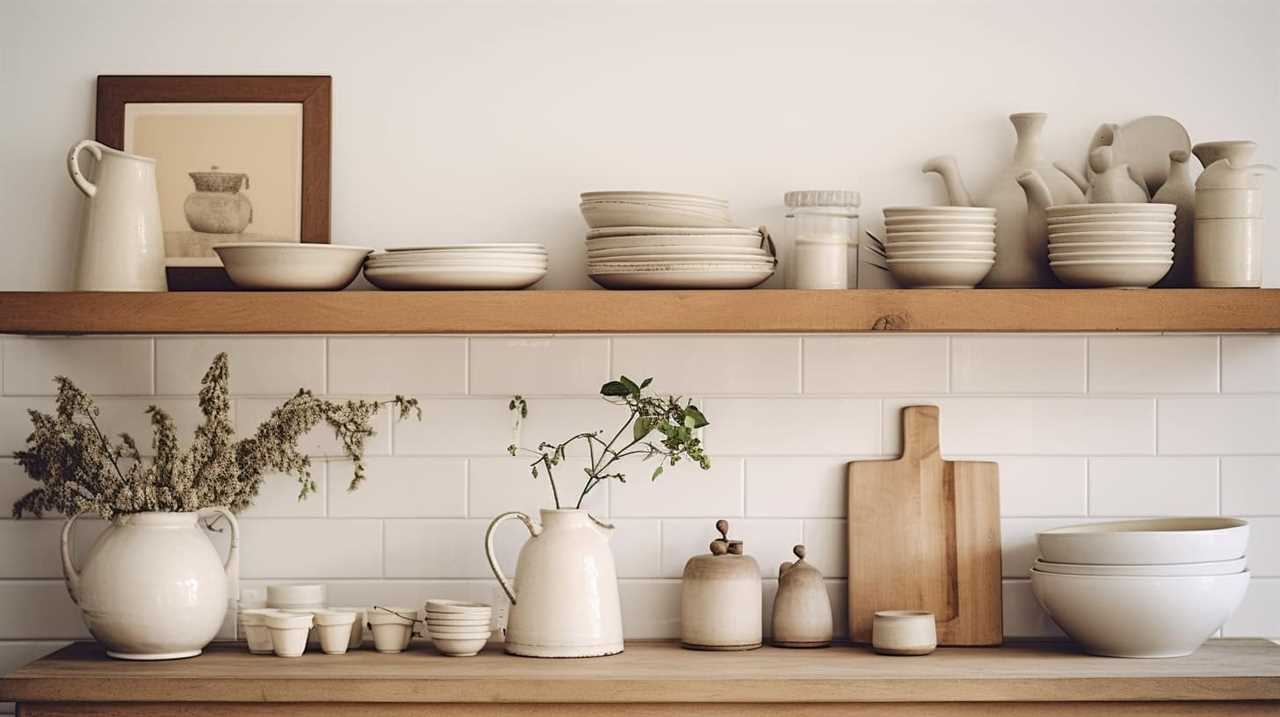
To ensure the effectiveness of surge protectors, it’s important to perform regular equipment maintenance and troubleshoot any appliance issues promptly. By doing so, we can maximize the protection offered by surge protectors and maintain the optimal functioning of our appliances.
Now, let’s move on to the next topic: extension cord safety.
Extension Cord Safety
To ensure the safety of our appliances and further protect them from potential damage, it’s crucial that we prioritize extension cord safety by using surge protectors. Here are some important points to consider:
- Prevent electrical fires: Surge protectors help in minimizing the risk of overheating and electrical fires by regulating the flow of electricity.
- Protect against power surges: Power surges can occur due to lightning strikes or utility grid fluctuations. Surge protectors safeguard appliances by diverting excess voltage away from them.
- Imagine the peace of mind knowing that your valuable appliances are shielded from sudden power spikes.
- Avoid the heartache of losing your expensive electronics to a power surge.
By investing in surge protectors and practicing proper plug maintenance, we can significantly reduce the chances of electrical accidents and prolong the lifespan of our appliances.
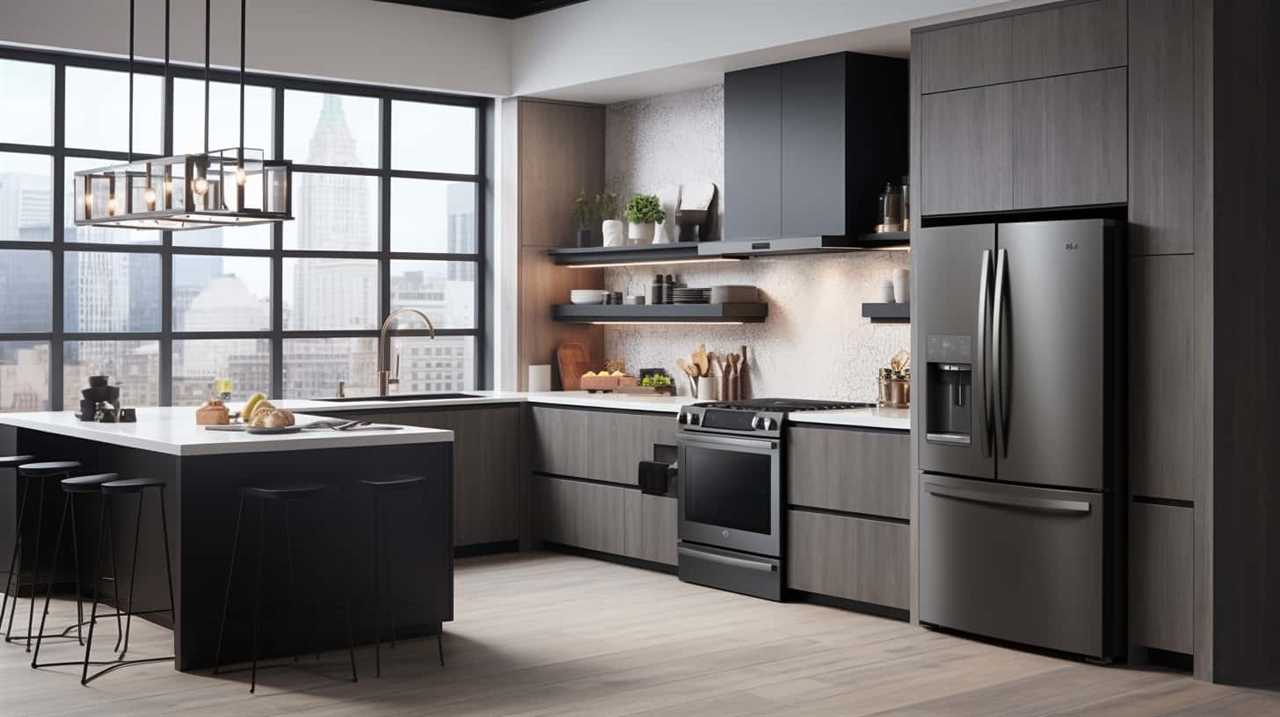
Unplug When Not in Use
When not in use, we recommend unplugging home appliances. This is an important step in ensuring plug safety and preventing electrical hazards in your home. Even when appliances are turned off, they can still consume small amounts of electricity if they remain plugged in. This standby power, also known as vampire power or phantom load, can’t only waste energy but also increase the risk of electrical accidents.
By unplugging appliances when they aren’t in use, you can reduce the risk of electrical hazards such as electrical shocks, fires, and short circuits. It also helps to extend the lifespan of your appliances by protecting them from power surges and other electrical issues.
To make this practice more convenient, you can use power strips with built-in switches. This allows you to easily turn off multiple appliances at once by simply flipping a switch. Additionally, consider using timers or smart plugs to automatically turn off appliances at certain times of the day or when they aren’t needed.
Avoid Overloading Outlets
Let’s ensure the safety of our home appliances by avoiding overloading outlets. Overloading outlets can lead to overheating, electrical fires, and damage to your appliances.
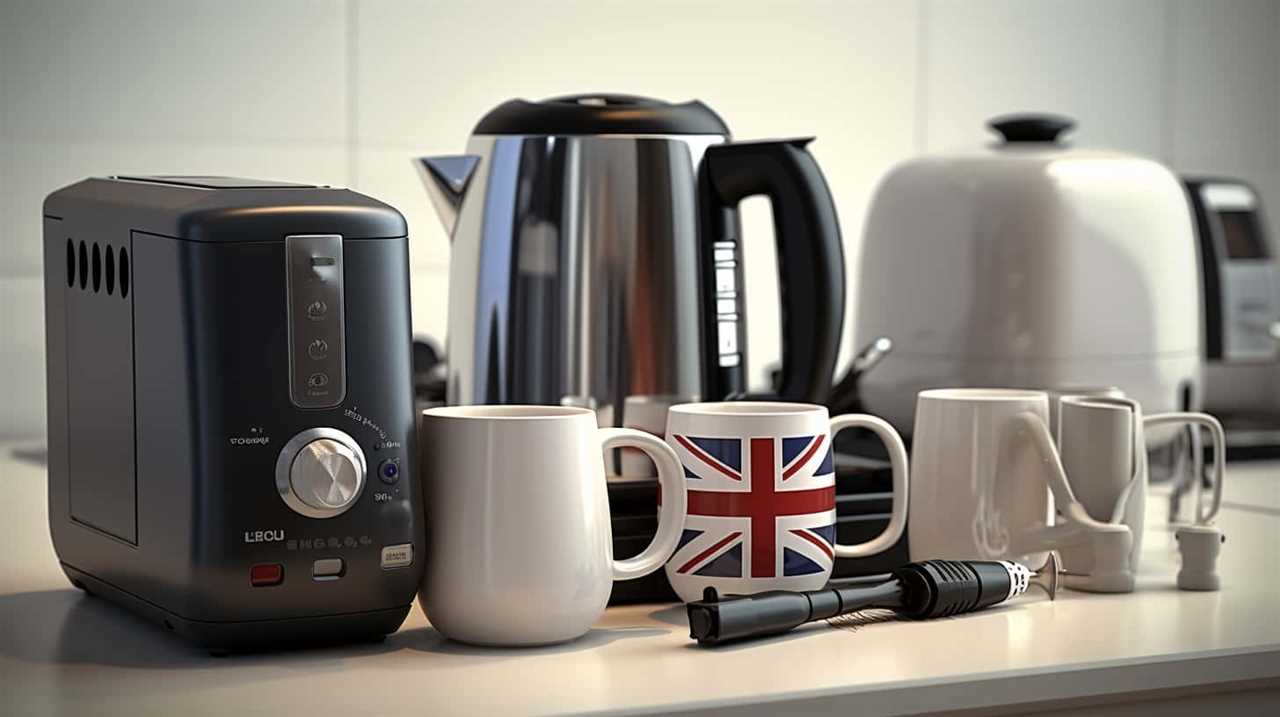
To help you understand the importance of this safety tip, here are a couple of points to consider:
- Extension cord safety: Extension cords are a convenient solution when you need to reach an outlet that’s far away. However, it’s crucial to use them properly to prevent overloading. Make sure to choose extension cords that are rated for the type of appliance you’re using and avoid daisy-chaining multiple extension cords together. This can put too much strain on the outlet and increase the risk of a fire.
- Unplug when not in use: Even when you’re not actively using an appliance, it can still draw power if it’s plugged in. This not only wastes energy but also increases the risk of overloading the outlet. Get into the habit of unplugging appliances when you’re not using them, especially those that consume a significant amount of power, such as space heaters or air conditioners.
Ventilate Properly
Proper ventilation is essential for maintaining the safety and efficiency of our home appliances. Without proper air circulation, appliances can overheat and malfunction, posing a serious risk to our homes and families.
To ensure proper ventilation, there are a few key tips to keep in mind.
Firstly, it’s important to allow enough space around appliances for air to flow freely. Avoid placing appliances in tight corners or against walls, as this can restrict airflow and hinder proper ventilation.

In addition, make sure that vents and air filters are kept clean and free from dust and debris. This will help to prevent blockages and ensure that air can circulate properly.
Another important tip is to avoid blocking vents or air intake areas. Appliances such as refrigerators, dryers, and air conditioners rely on these openings to draw in fresh air. Blocking these areas can cause appliances to work harder and consume more energy, while also increasing the risk of overheating.
By following these ventilation tips, we can maintain the safety and efficiency of our home appliances.
In the next section, we’ll discuss the importance of keeping appliances clean and well-maintained to further ensure their longevity and optimal performance.

Keep Appliances Clean and Well-Maintained
Regular maintenance is crucial for preventing appliance malfunctions and ensuring their safe operation.
By regularly cleaning appliances, we can remove built-up dirt and debris that can pose a fire hazard or interfere with proper functioning.
Additionally, well-maintained appliances are more likely to last longer, saving us money in the long run.
Regular Maintenance Prevents Malfunctions
We should make sure to keep our appliances clean and well-maintained to prevent malfunctions. Regular maintenance benefits not only the lifespan of our appliances but also our overall safety.

Here are a couple of reasons why we should prioritize regular maintenance:
- Enhanced performance: Regular maintenance ensures that our appliances continue to perform at their best, delivering optimal results every time. This allows us to enjoy the convenience and efficiency they were designed to provide.
- Troubleshooting techniques: By regularly maintaining our appliances, we become familiar with their operations and can identify any potential issues early on. This enables us to troubleshoot and address problems before they escalate, saving us time and money in the long run.
By incorporating regular maintenance into our routine, we can prevent malfunctions and ensure our appliances remain in excellent condition.
Now let’s explore how clean appliances also play a crucial role in preventing accidents.
Clean Appliances Prevent Accidents
To ensure the safety of our homes and prevent accidents, it’s essential to keep our appliances clean and well-maintained.
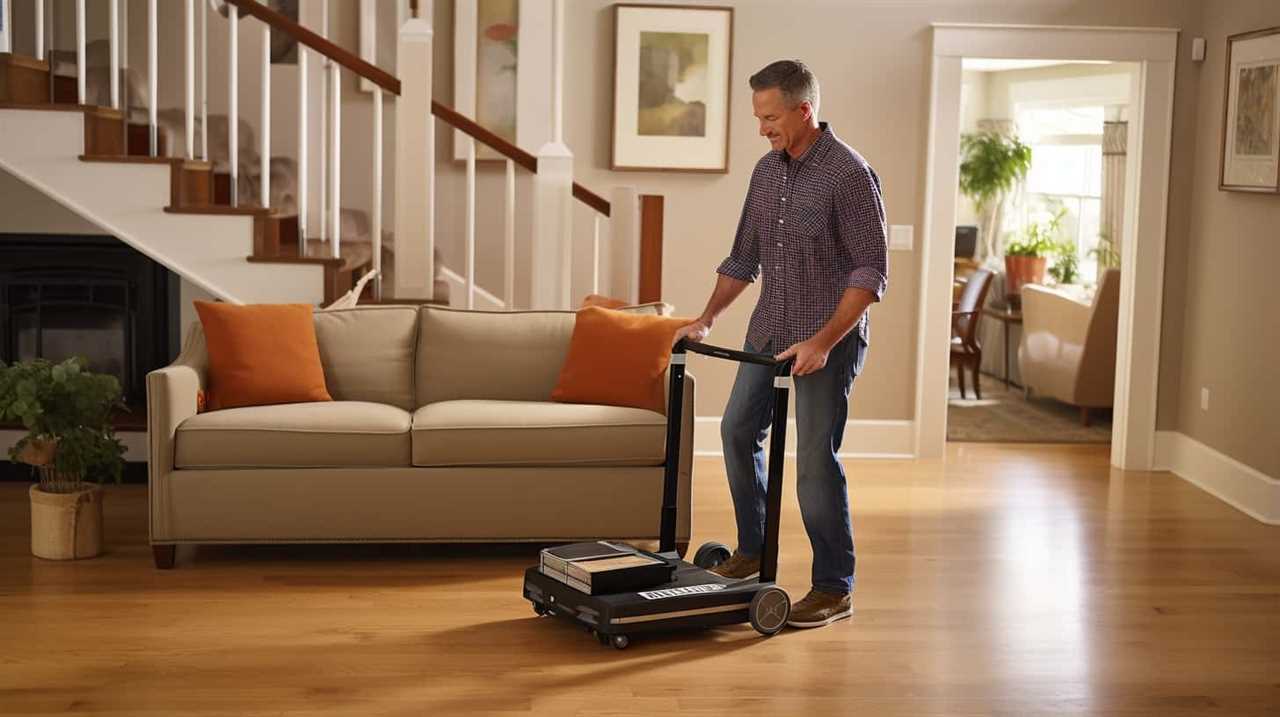
Regular cleaning and maintenance not only extend the lifespan of our appliances but also prevent potential accidents.
One of the first steps in preventing appliance accidents is to follow proper appliance cleaning techniques. For example, when cleaning a refrigerator, it’s important to remove expired food regularly and keep the coils dust-free to prevent overheating. Similarly, cleaning the lint trap in a dryer after every use helps prevent fire hazards.
Additionally, regular maintenance, such as checking for loose wires or leaks, can help identify potential issues before they become major problems.
Use Appliances for Intended Purposes Only
Proper appliance usage requires adherence to the intended purposes of each device. When using home appliances, it’s crucial to choose the appropriate appliance for the task at hand and avoid any misuse. Here are two important points to keep in mind:
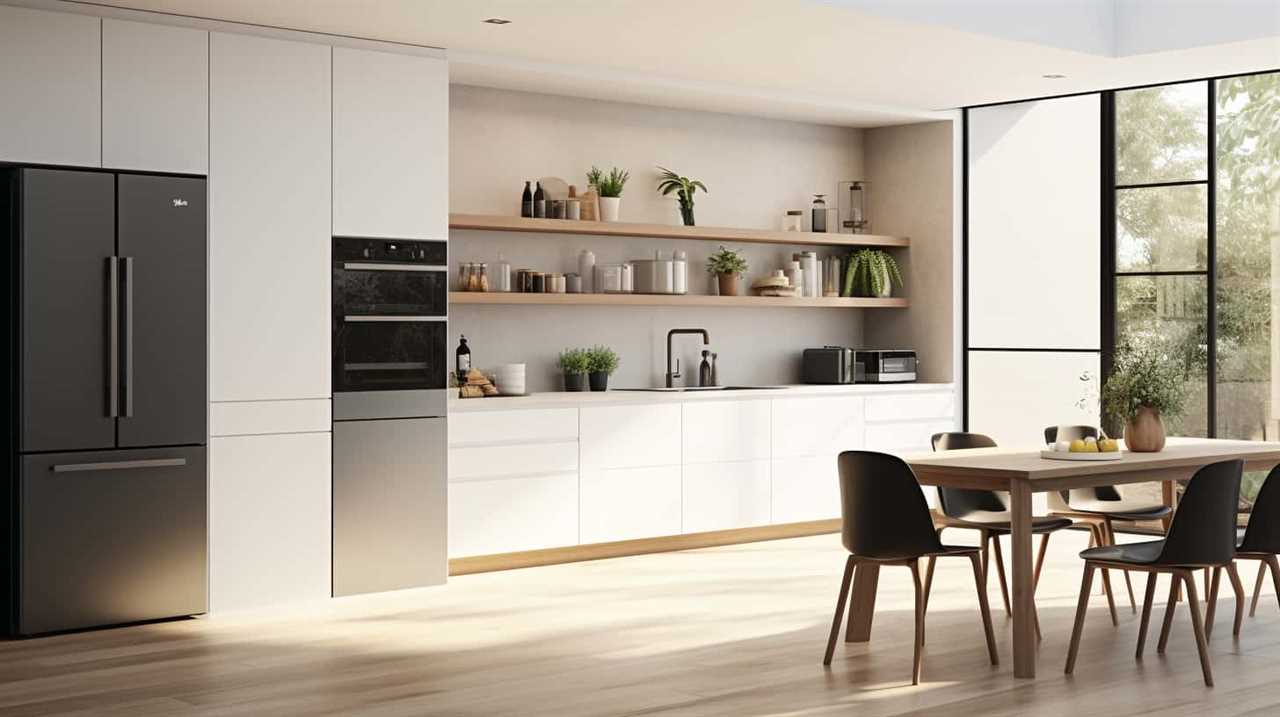
- Safety first: Using appliances for their intended purposes ensures your safety and the longevity of the device. Avoid attempting to repurpose an appliance for a task it wasn’t designed for, as this can lead to accidents or damage. Stick to the manufacturer’s instructions and guidelines to minimize risks and ensure optimal performance.
- Efficiency and effectiveness: Using appliances as intended maximizes their efficiency and effectiveness. Each appliance is designed with specific features and functions to perform certain tasks efficiently. When used correctly, appliances can save you time, energy, and effort. By avoiding misuse, you can ensure that your appliances work at their best capacity, providing you with the desired results.
Keep Children and Pets Away
When using home appliances, it is important to ensure that children and pets are kept away for their safety. As curious explorers, children and pets may unknowingly put themselves at risk by tampering with or getting too close to appliances. To prevent accidents and injuries, it is crucial to implement effective childproofing strategies and educate everyone in the household about potential hazards.
To emphasize the importance of keeping children and pets away from appliances, let’s take a look at the following table:
| Childproofing Strategies | Potential Hazards |
|---|---|
| Install safety gates or locks to restrict access to appliance areas | Electrical shock |
| Keep appliance cords out of reach or hidden from sight | Strangulation or tripping hazards |
| Store cleaning products and detergents in locked cabinets | Poisoning |
| Secure heavy appliances to prevent tipping over | Crushing or entrapment |
| Educate children about the dangers of playing with appliances | Burns or cuts |
Be Cautious With Gas Appliances
Our top priority is ensuring the safe use of our gas appliances. Gas appliances provide convenience and efficiency, but it’s crucial to take precautions to prevent accidents and promote gas appliance safety. Here are some essential tips to keep in mind:
- Regular Maintenance: Schedule regular maintenance check-ups for your gas appliances to ensure they’re in good working condition and to detect any potential issues early on.
- Proper Ventilation: Gas appliances produce harmful byproducts such as carbon monoxide. Ensure proper ventilation in your home to prevent the buildup of these gases.
- Regular Inspections: Regularly inspect the ventilation system to ensure it’s functioning correctly and not blocked or damaged.
- Carbon Monoxide Detectors: Install carbon monoxide detectors near your gas appliances and regularly check their batteries to ensure they’re functioning properly.
- Gas Leak Prevention: Gas leaks can be extremely dangerous. Take the following steps to prevent gas leaks:
- Regular Inspections: Regularly inspect gas lines, connections, and fittings for any signs of wear or damage.
- Proper Installation: Ensure gas appliances are installed correctly by a professional to prevent leaks.
Install Carbon Monoxide Detectors
Installing carbon monoxide detectors is an essential step in ensuring the safety of our home appliances. Carbon monoxide (CO) is a colorless, odorless gas that can be emitted by gas appliances such as stoves, furnaces, and water heaters. It’s a silent killer, as exposure to high levels of CO can lead to carbon monoxide poisoning, which can be fatal.
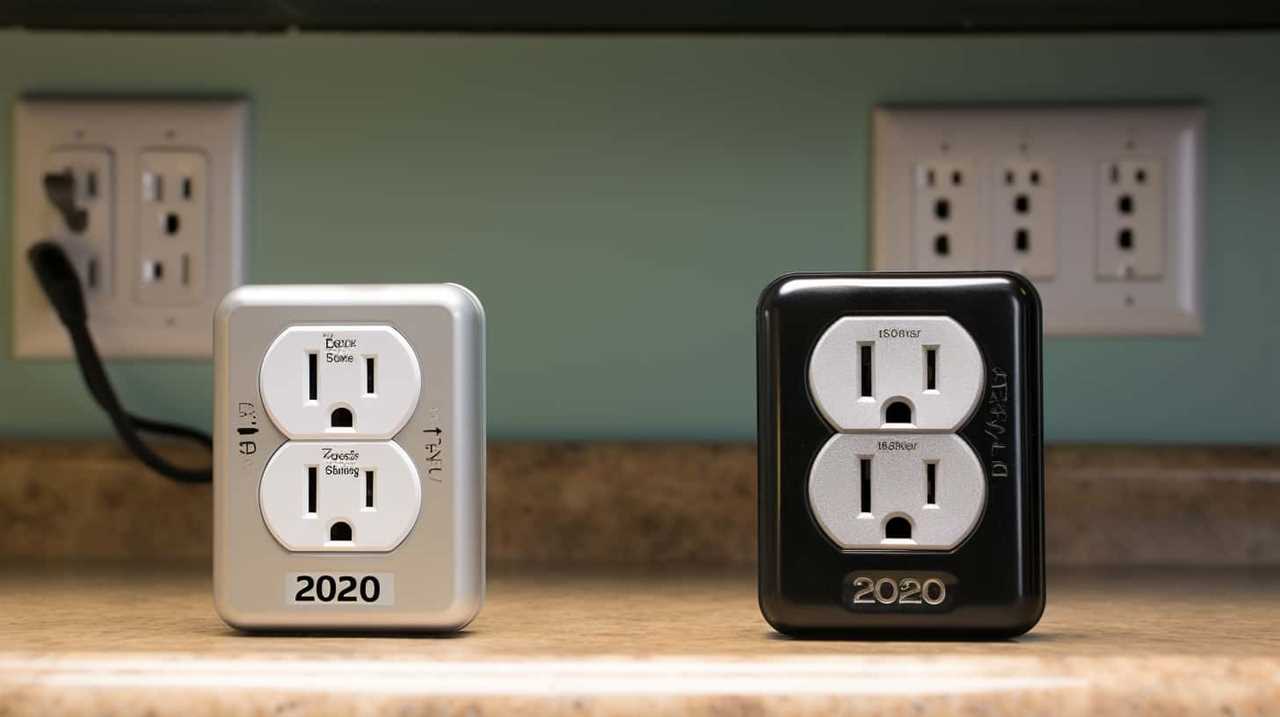
To prevent carbon monoxide poisoning, it’s crucial to install CO detectors in appropriate locations throughout our homes. These detectors can detect the presence of CO in the air and alert us to potential dangers. They should be placed near sleeping areas and on each level of our homes, including the basement.
Symptoms of carbon monoxide poisoning can vary from mild to severe and may include headache, dizziness, nausea, confusion, and shortness of breath. If we or our family members experience any of these symptoms, it’s important to evacuate the premises immediately and seek medical attention.
Treatment for carbon monoxide poisoning involves removing the affected individual from the source of CO and administering oxygen therapy. In severe cases, hyperbaric oxygen therapy may be necessary to increase the oxygen levels in the blood and reduce the effects of CO poisoning.
Stay Alert for Strange Noises or Smells
We must remain vigilant for any unusual noises or smells when using our home appliances. Identifying strange noises and troubleshooting unusual smells is crucial for maintaining the safety of our household. Here are a few key points to keep in mind:

- Strange Noises:
- Pay attention to any rattling, grinding, or squeaking sounds coming from your appliances.
- Unusual noises could indicate loose parts, damaged components, or imminent malfunctions.
- Identifying Unusual Smells:
- Be aware of any burning, electrical, or chemical smells emitting from your appliances.
- Unusual odors might suggest wiring issues, overheating, or potential leaks.
Remaining alert to these signs can help prevent hazardous situations and costly repairs. If you encounter any strange noises or smells, it’s essential to take immediate action. Safely turn off the appliance, unplug it, and consult the user manual or contact a professional technician for further assistance.
By staying vigilant and addressing unusual noises or smells promptly, we can ensure the continued functionality and safety of our home appliances.
Now, let’s move on to the next important topic of regularly testing and replacing batteries in smoke detectors.
Regularly Test and Replace Batteries in Smoke Detectors
To ensure the safety of our household, it’s vital that we regularly test and replace the batteries in our smoke detectors. Battery testing is a crucial task that shouldn’t be overlooked. Smoke detectors rely on batteries to function properly, and without reliable detectors, our lives could be at risk in the event of a fire.
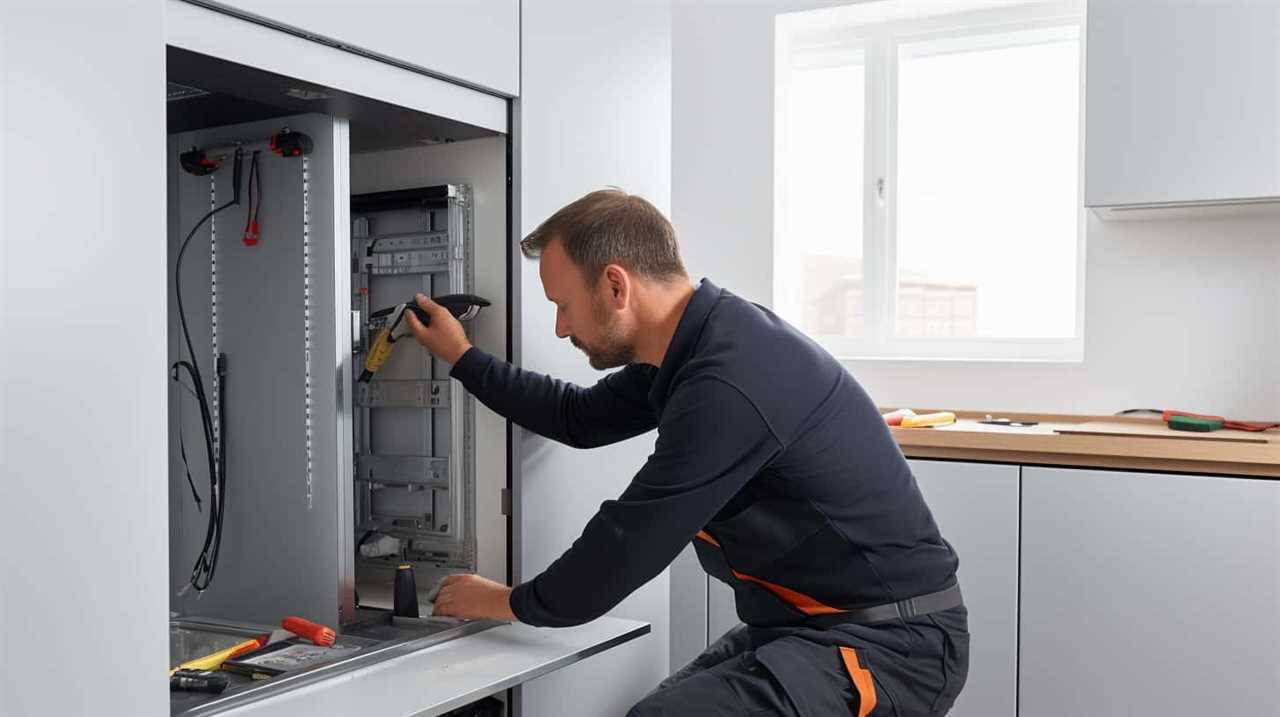
Regular testing of smoke detectors is necessary to ensure that they’re in good working condition. It’s recommended to test the detectors at least once a month by pressing the ‘test’ button. This will ensure that the alarm is loud enough and can be heard throughout the house.
In addition to regular testing, it’s important to replace the batteries in our smoke detectors on a regular basis. Most detectors require batteries to be replaced every six months, but it’s best to check the manufacturer’s instructions for specific recommendations. It’s also a good idea to replace the batteries immediately if the low battery warning chirps sound.
Frequently Asked Questions
How Often Should I Replace the Batteries in My Carbon Monoxide Detectors?
We should replace the batteries in our carbon monoxide detectors regularly to ensure their proper functioning. The frequency of battery replacement depends on the type of batteries used and the manufacturer’s recommendations.
Regular maintenance of carbon monoxide detectors is crucial for our safety, as these devices play a vital role in detecting this odorless gas. By regularly checking and replacing the batteries, we can ensure that our carbon monoxide detectors are always ready to provide us with early warning signs of potential danger.
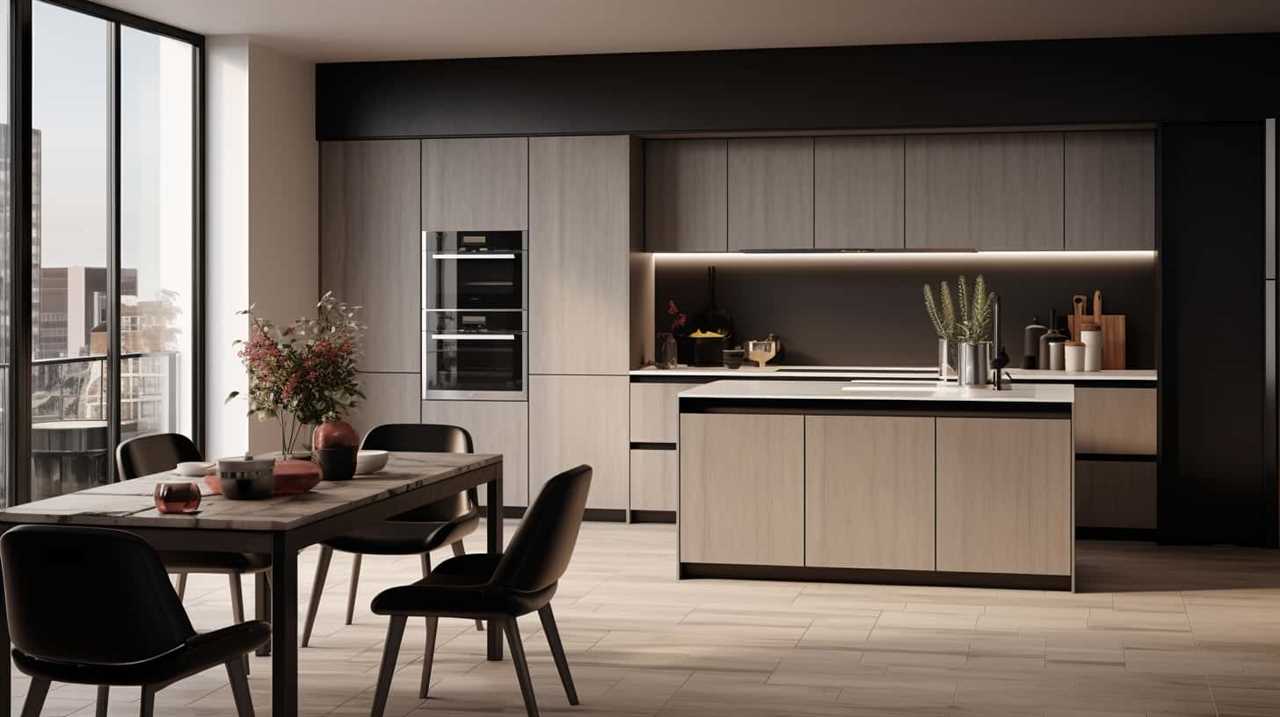
What Are Some Signs That My Appliance May Be Overloaded?
When it comes to signs that your appliance may be overloaded, there are a few warning signs to watch out for.
First, be on the lookout for any electrical problems, like flickering lights or tripped circuit breakers. These can be indicators that your appliance is drawing too much power.
Additionally, if you notice strange sounds or smells coming from your appliance, it could be a sign of overload.
It’s important to address these issues promptly to ensure the safety of your home and appliances.

Can I Use an Extension Cord With My Home Appliances?
Yes, we can use extension cords with our home appliances, but it’s important to do so safely. Extension cord safety is crucial to prevent electrical hazards.
To ensure proper use of extension cords, we should choose cords that are rated for the wattage of our appliances, avoid overloading the cords, and never run them under rugs or furniture.
It’s also important to regularly inspect the cords for any signs of damage and replace them if necessary.
How Can I Properly Ventilate My Appliances?
Proper ventilation is crucial for appliance maintenance. It ensures that your appliances function efficiently and reduces the risk of overheating.
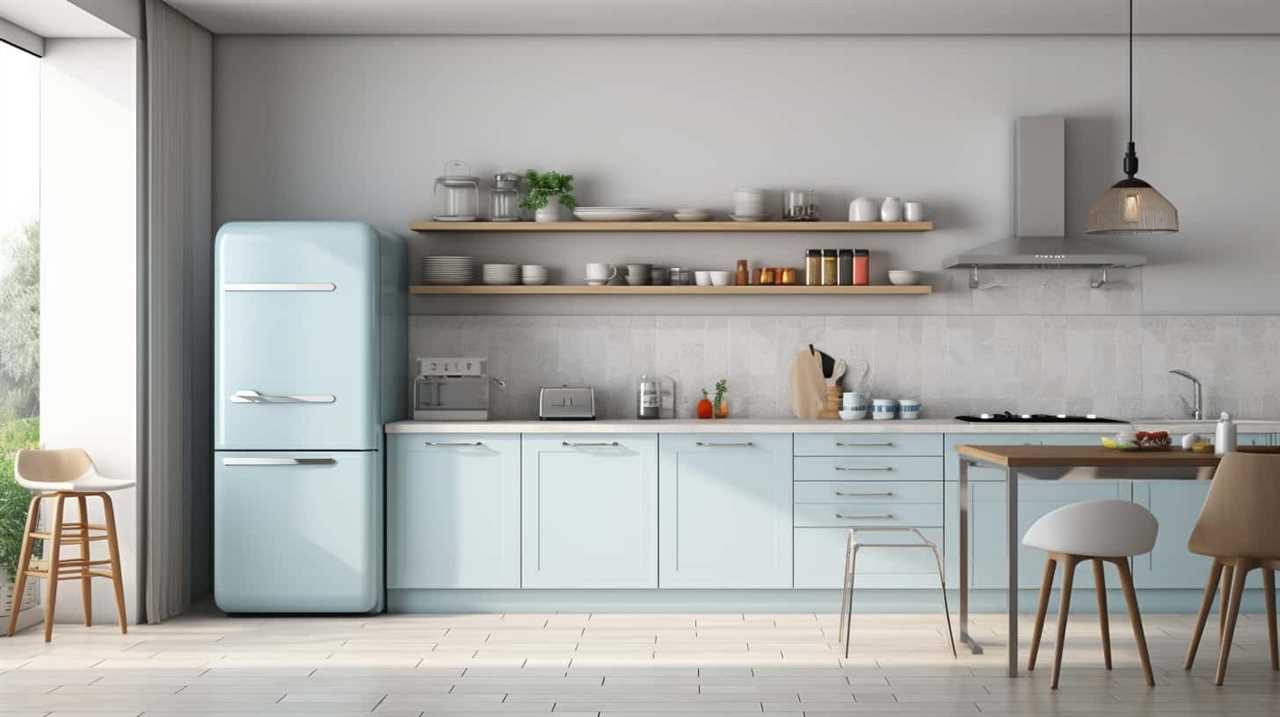
To achieve this, make sure there’s enough space around your appliances for air to circulate freely. Avoid blocking vents or placing them in enclosed spaces.
Regularly clean filters and remove any dust or debris that may obstruct airflow.
Maintaining proper ventilation will prolong the lifespan of your appliances and keep them running smoothly.
Is It Safe to Leave My Appliances Plugged in When I’m Not Using Them?
Leaving appliances plugged in when not in use can have a significant energy consumption impact and potentially pose fire hazards. It’s important to be mindful of the potential risks and take necessary precautions.
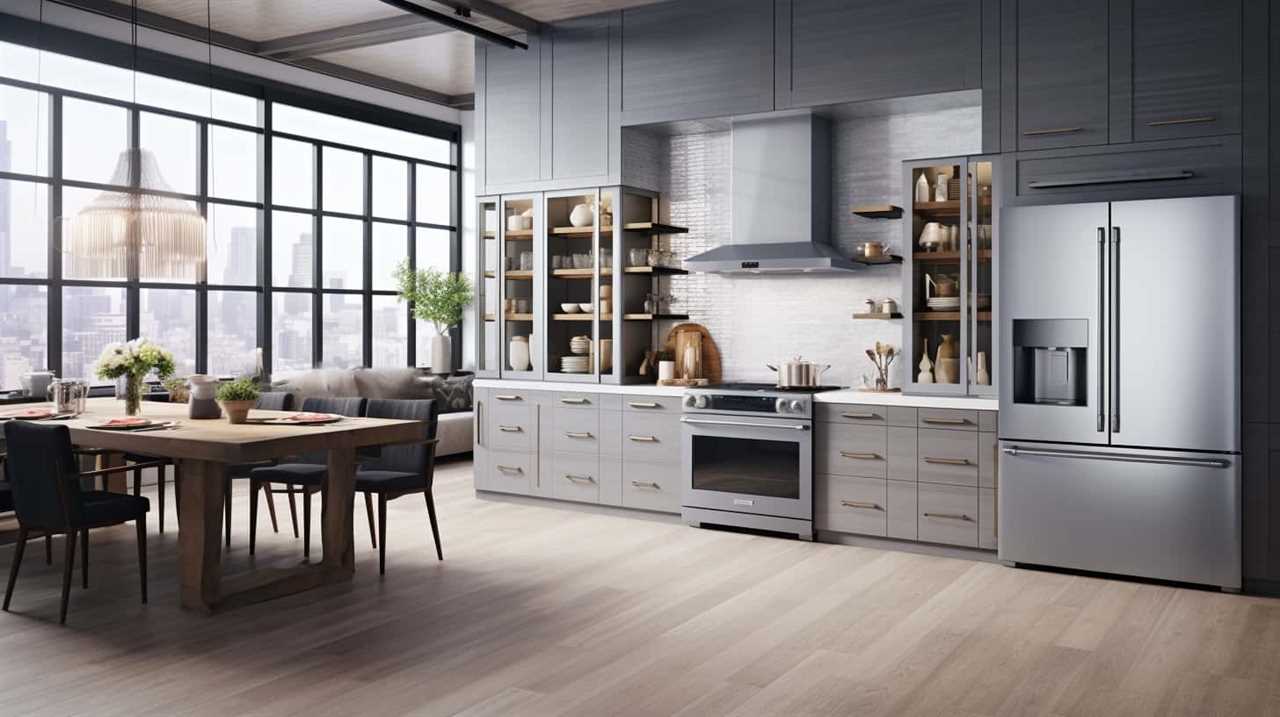
Unplugging appliances not only helps save energy but also reduces the chances of electrical malfunctions or overheating that could lead to fires. By adopting this simple habit, we can ensure a safer home environment and contribute to a more energy-efficient lifestyle.
Conclusion
In conclusion, by following these seven essential tips for safe home appliance use, we can ensure the well-being of our households.
Did you know that according to the National Fire Protection Association, home fires caused by electrical appliances result in an estimated $1.3 billion in property damage annually?
By taking proactive measures and being cautious, we can greatly reduce the risk of accidents and protect our homes and loved ones.

Stay informed, stay safe!



